The Global Financial Crisis of 2008 and Lehman Crisis in Hong Kong
VerifiedAdded on 2023/05/28
|9
|2270
|83
Report
AI Summary
This report provides a comprehensive analysis of the 2008 Global Financial Crisis, detailing its origins in the US housing market, the role of deregulation, and the practice of securitization. It explores the collapse of Lehman Brothers and its specific impact on Hong Kong, focusing on the Minibond saga and the involvement of the Securities and Futures Commission (SFC). The report examines the causes of the crisis, including the sale of high-risk products to vulnerable investors, and the failures of regulatory oversight. It highlights the effects of the crisis on developing countries and the role of the SFC's code of conduct in the Hong Kong crisis. The analysis includes the violation of the SFC code of conduct by Lehman Brothers, the targeting of less-informed investors, and the implications of complex financial structures. The report concludes by emphasizing the need for tighter supervision and regulatory reform to prevent similar events in the future.
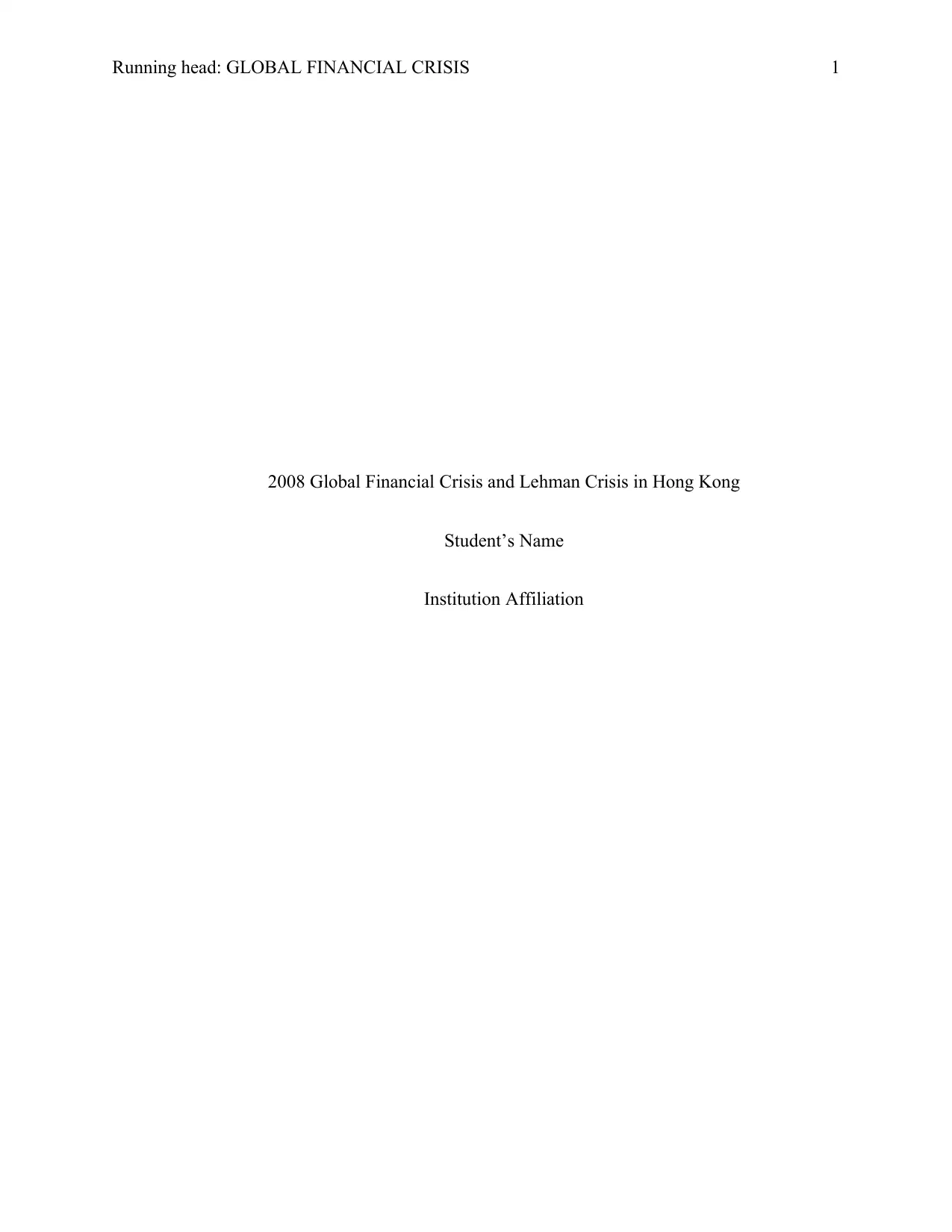
Running head: GLOBAL FINANCIAL CRISIS 1
2008 Global Financial Crisis and Lehman Crisis in Hong Kong
Student’s Name
Institution Affiliation
2008 Global Financial Crisis and Lehman Crisis in Hong Kong
Student’s Name
Institution Affiliation
Paraphrase This Document
Need a fresh take? Get an instant paraphrase of this document with our AI Paraphraser
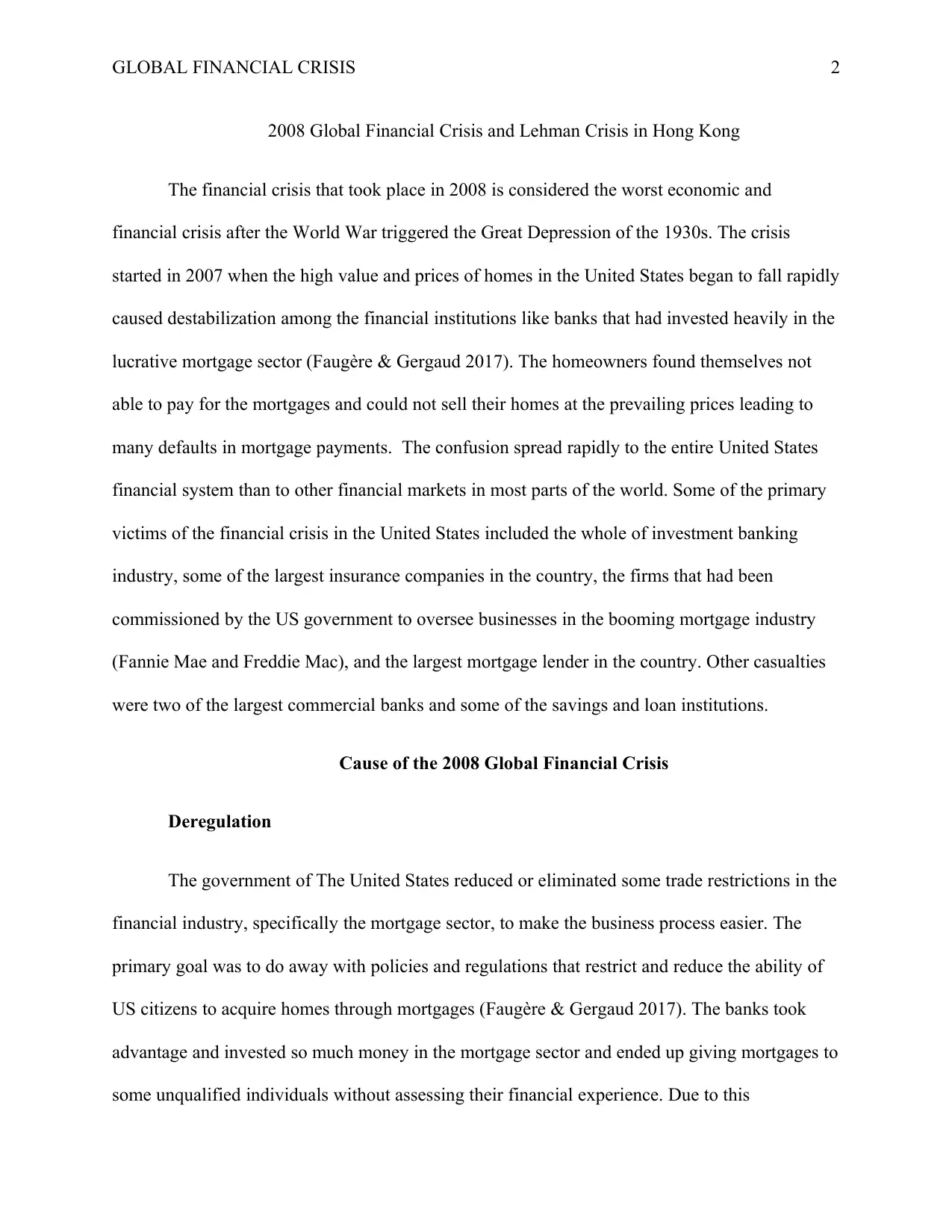
GLOBAL FINANCIAL CRISIS 2
2008 Global Financial Crisis and Lehman Crisis in Hong Kong
The financial crisis that took place in 2008 is considered the worst economic and
financial crisis after the World War triggered the Great Depression of the 1930s. The crisis
started in 2007 when the high value and prices of homes in the United States began to fall rapidly
caused destabilization among the financial institutions like banks that had invested heavily in the
lucrative mortgage sector (Faugère & Gergaud 2017). The homeowners found themselves not
able to pay for the mortgages and could not sell their homes at the prevailing prices leading to
many defaults in mortgage payments. The confusion spread rapidly to the entire United States
financial system than to other financial markets in most parts of the world. Some of the primary
victims of the financial crisis in the United States included the whole of investment banking
industry, some of the largest insurance companies in the country, the firms that had been
commissioned by the US government to oversee businesses in the booming mortgage industry
(Fannie Mae and Freddie Mac), and the largest mortgage lender in the country. Other casualties
were two of the largest commercial banks and some of the savings and loan institutions.
Cause of the 2008 Global Financial Crisis
Deregulation
The government of The United States reduced or eliminated some trade restrictions in the
financial industry, specifically the mortgage sector, to make the business process easier. The
primary goal was to do away with policies and regulations that restrict and reduce the ability of
US citizens to acquire homes through mortgages (Faugère & Gergaud 2017). The banks took
advantage and invested so much money in the mortgage sector and ended up giving mortgages to
some unqualified individuals without assessing their financial experience. Due to this
2008 Global Financial Crisis and Lehman Crisis in Hong Kong
The financial crisis that took place in 2008 is considered the worst economic and
financial crisis after the World War triggered the Great Depression of the 1930s. The crisis
started in 2007 when the high value and prices of homes in the United States began to fall rapidly
caused destabilization among the financial institutions like banks that had invested heavily in the
lucrative mortgage sector (Faugère & Gergaud 2017). The homeowners found themselves not
able to pay for the mortgages and could not sell their homes at the prevailing prices leading to
many defaults in mortgage payments. The confusion spread rapidly to the entire United States
financial system than to other financial markets in most parts of the world. Some of the primary
victims of the financial crisis in the United States included the whole of investment banking
industry, some of the largest insurance companies in the country, the firms that had been
commissioned by the US government to oversee businesses in the booming mortgage industry
(Fannie Mae and Freddie Mac), and the largest mortgage lender in the country. Other casualties
were two of the largest commercial banks and some of the savings and loan institutions.
Cause of the 2008 Global Financial Crisis
Deregulation
The government of The United States reduced or eliminated some trade restrictions in the
financial industry, specifically the mortgage sector, to make the business process easier. The
primary goal was to do away with policies and regulations that restrict and reduce the ability of
US citizens to acquire homes through mortgages (Faugère & Gergaud 2017). The banks took
advantage and invested so much money in the mortgage sector and ended up giving mortgages to
some unqualified individuals without assessing their financial experience. Due to this
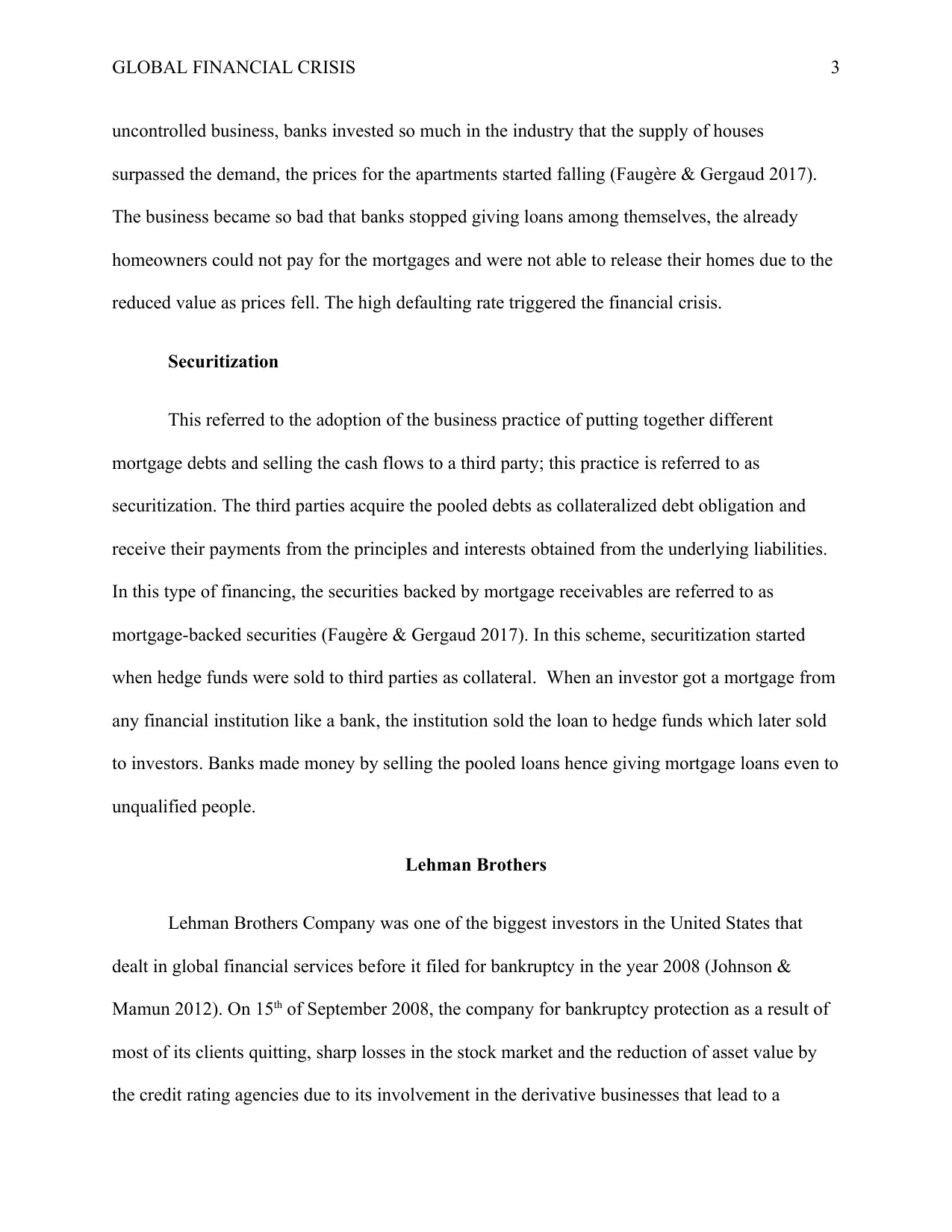
GLOBAL FINANCIAL CRISIS 3
uncontrolled business, banks invested so much in the industry that the supply of houses
surpassed the demand, the prices for the apartments started falling (Faugère & Gergaud 2017).
The business became so bad that banks stopped giving loans among themselves, the already
homeowners could not pay for the mortgages and were not able to release their homes due to the
reduced value as prices fell. The high defaulting rate triggered the financial crisis.
Securitization
This referred to the adoption of the business practice of putting together different
mortgage debts and selling the cash flows to a third party; this practice is referred to as
securitization. The third parties acquire the pooled debts as collateralized debt obligation and
receive their payments from the principles and interests obtained from the underlying liabilities.
In this type of financing, the securities backed by mortgage receivables are referred to as
mortgage-backed securities (Faugère & Gergaud 2017). In this scheme, securitization started
when hedge funds were sold to third parties as collateral. When an investor got a mortgage from
any financial institution like a bank, the institution sold the loan to hedge funds which later sold
to investors. Banks made money by selling the pooled loans hence giving mortgage loans even to
unqualified people.
Lehman Brothers
Lehman Brothers Company was one of the biggest investors in the United States that
dealt in global financial services before it filed for bankruptcy in the year 2008 (Johnson &
Mamun 2012). On 15th of September 2008, the company for bankruptcy protection as a result of
most of its clients quitting, sharp losses in the stock market and the reduction of asset value by
the credit rating agencies due to its involvement in the derivative businesses that lead to a
uncontrolled business, banks invested so much in the industry that the supply of houses
surpassed the demand, the prices for the apartments started falling (Faugère & Gergaud 2017).
The business became so bad that banks stopped giving loans among themselves, the already
homeowners could not pay for the mortgages and were not able to release their homes due to the
reduced value as prices fell. The high defaulting rate triggered the financial crisis.
Securitization
This referred to the adoption of the business practice of putting together different
mortgage debts and selling the cash flows to a third party; this practice is referred to as
securitization. The third parties acquire the pooled debts as collateralized debt obligation and
receive their payments from the principles and interests obtained from the underlying liabilities.
In this type of financing, the securities backed by mortgage receivables are referred to as
mortgage-backed securities (Faugère & Gergaud 2017). In this scheme, securitization started
when hedge funds were sold to third parties as collateral. When an investor got a mortgage from
any financial institution like a bank, the institution sold the loan to hedge funds which later sold
to investors. Banks made money by selling the pooled loans hence giving mortgage loans even to
unqualified people.
Lehman Brothers
Lehman Brothers Company was one of the biggest investors in the United States that
dealt in global financial services before it filed for bankruptcy in the year 2008 (Johnson &
Mamun 2012). On 15th of September 2008, the company for bankruptcy protection as a result of
most of its clients quitting, sharp losses in the stock market and the reduction of asset value by
the credit rating agencies due to its involvement in the derivative businesses that lead to a
⊘ This is a preview!⊘
Do you want full access?
Subscribe today to unlock all pages.

Trusted by 1+ million students worldwide
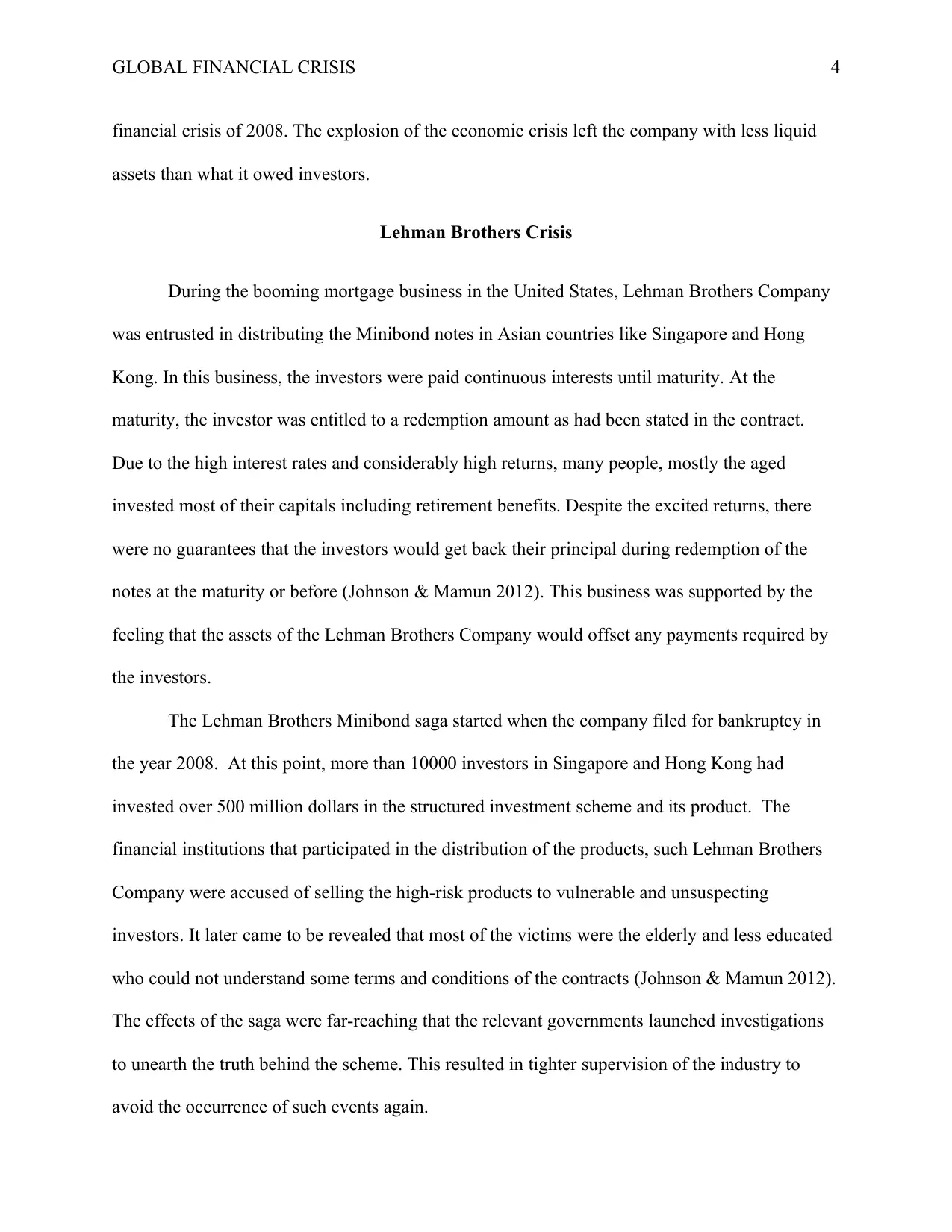
GLOBAL FINANCIAL CRISIS 4
financial crisis of 2008. The explosion of the economic crisis left the company with less liquid
assets than what it owed investors.
Lehman Brothers Crisis
During the booming mortgage business in the United States, Lehman Brothers Company
was entrusted in distributing the Minibond notes in Asian countries like Singapore and Hong
Kong. In this business, the investors were paid continuous interests until maturity. At the
maturity, the investor was entitled to a redemption amount as had been stated in the contract.
Due to the high interest rates and considerably high returns, many people, mostly the aged
invested most of their capitals including retirement benefits. Despite the excited returns, there
were no guarantees that the investors would get back their principal during redemption of the
notes at the maturity or before (Johnson & Mamun 2012). This business was supported by the
feeling that the assets of the Lehman Brothers Company would offset any payments required by
the investors.
The Lehman Brothers Minibond saga started when the company filed for bankruptcy in
the year 2008. At this point, more than 10000 investors in Singapore and Hong Kong had
invested over 500 million dollars in the structured investment scheme and its product. The
financial institutions that participated in the distribution of the products, such Lehman Brothers
Company were accused of selling the high-risk products to vulnerable and unsuspecting
investors. It later came to be revealed that most of the victims were the elderly and less educated
who could not understand some terms and conditions of the contracts (Johnson & Mamun 2012).
The effects of the saga were far-reaching that the relevant governments launched investigations
to unearth the truth behind the scheme. This resulted in tighter supervision of the industry to
avoid the occurrence of such events again.
financial crisis of 2008. The explosion of the economic crisis left the company with less liquid
assets than what it owed investors.
Lehman Brothers Crisis
During the booming mortgage business in the United States, Lehman Brothers Company
was entrusted in distributing the Minibond notes in Asian countries like Singapore and Hong
Kong. In this business, the investors were paid continuous interests until maturity. At the
maturity, the investor was entitled to a redemption amount as had been stated in the contract.
Due to the high interest rates and considerably high returns, many people, mostly the aged
invested most of their capitals including retirement benefits. Despite the excited returns, there
were no guarantees that the investors would get back their principal during redemption of the
notes at the maturity or before (Johnson & Mamun 2012). This business was supported by the
feeling that the assets of the Lehman Brothers Company would offset any payments required by
the investors.
The Lehman Brothers Minibond saga started when the company filed for bankruptcy in
the year 2008. At this point, more than 10000 investors in Singapore and Hong Kong had
invested over 500 million dollars in the structured investment scheme and its product. The
financial institutions that participated in the distribution of the products, such Lehman Brothers
Company were accused of selling the high-risk products to vulnerable and unsuspecting
investors. It later came to be revealed that most of the victims were the elderly and less educated
who could not understand some terms and conditions of the contracts (Johnson & Mamun 2012).
The effects of the saga were far-reaching that the relevant governments launched investigations
to unearth the truth behind the scheme. This resulted in tighter supervision of the industry to
avoid the occurrence of such events again.
Paraphrase This Document
Need a fresh take? Get an instant paraphrase of this document with our AI Paraphraser
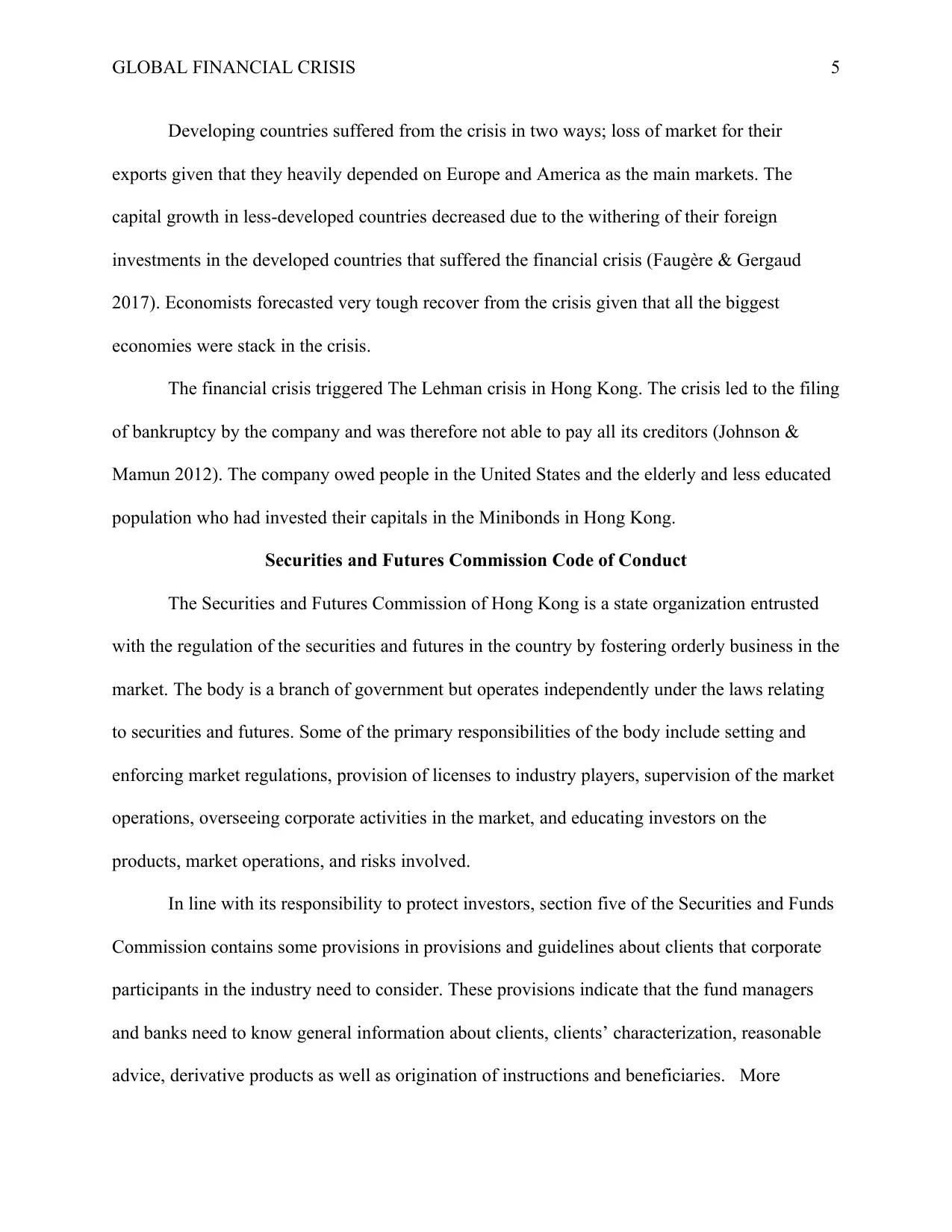
GLOBAL FINANCIAL CRISIS 5
Developing countries suffered from the crisis in two ways; loss of market for their
exports given that they heavily depended on Europe and America as the main markets. The
capital growth in less-developed countries decreased due to the withering of their foreign
investments in the developed countries that suffered the financial crisis (Faugère & Gergaud
2017). Economists forecasted very tough recover from the crisis given that all the biggest
economies were stack in the crisis.
The financial crisis triggered The Lehman crisis in Hong Kong. The crisis led to the filing
of bankruptcy by the company and was therefore not able to pay all its creditors (Johnson &
Mamun 2012). The company owed people in the United States and the elderly and less educated
population who had invested their capitals in the Minibonds in Hong Kong.
Securities and Futures Commission Code of Conduct
The Securities and Futures Commission of Hong Kong is a state organization entrusted
with the regulation of the securities and futures in the country by fostering orderly business in the
market. The body is a branch of government but operates independently under the laws relating
to securities and futures. Some of the primary responsibilities of the body include setting and
enforcing market regulations, provision of licenses to industry players, supervision of the market
operations, overseeing corporate activities in the market, and educating investors on the
products, market operations, and risks involved.
In line with its responsibility to protect investors, section five of the Securities and Funds
Commission contains some provisions in provisions and guidelines about clients that corporate
participants in the industry need to consider. These provisions indicate that the fund managers
and banks need to know general information about clients, clients’ characterization, reasonable
advice, derivative products as well as origination of instructions and beneficiaries. More
Developing countries suffered from the crisis in two ways; loss of market for their
exports given that they heavily depended on Europe and America as the main markets. The
capital growth in less-developed countries decreased due to the withering of their foreign
investments in the developed countries that suffered the financial crisis (Faugère & Gergaud
2017). Economists forecasted very tough recover from the crisis given that all the biggest
economies were stack in the crisis.
The financial crisis triggered The Lehman crisis in Hong Kong. The crisis led to the filing
of bankruptcy by the company and was therefore not able to pay all its creditors (Johnson &
Mamun 2012). The company owed people in the United States and the elderly and less educated
population who had invested their capitals in the Minibonds in Hong Kong.
Securities and Futures Commission Code of Conduct
The Securities and Futures Commission of Hong Kong is a state organization entrusted
with the regulation of the securities and futures in the country by fostering orderly business in the
market. The body is a branch of government but operates independently under the laws relating
to securities and futures. Some of the primary responsibilities of the body include setting and
enforcing market regulations, provision of licenses to industry players, supervision of the market
operations, overseeing corporate activities in the market, and educating investors on the
products, market operations, and risks involved.
In line with its responsibility to protect investors, section five of the Securities and Funds
Commission contains some provisions in provisions and guidelines about clients that corporate
participants in the industry need to consider. These provisions indicate that the fund managers
and banks need to know general information about clients, clients’ characterization, reasonable
advice, derivative products as well as origination of instructions and beneficiaries. More
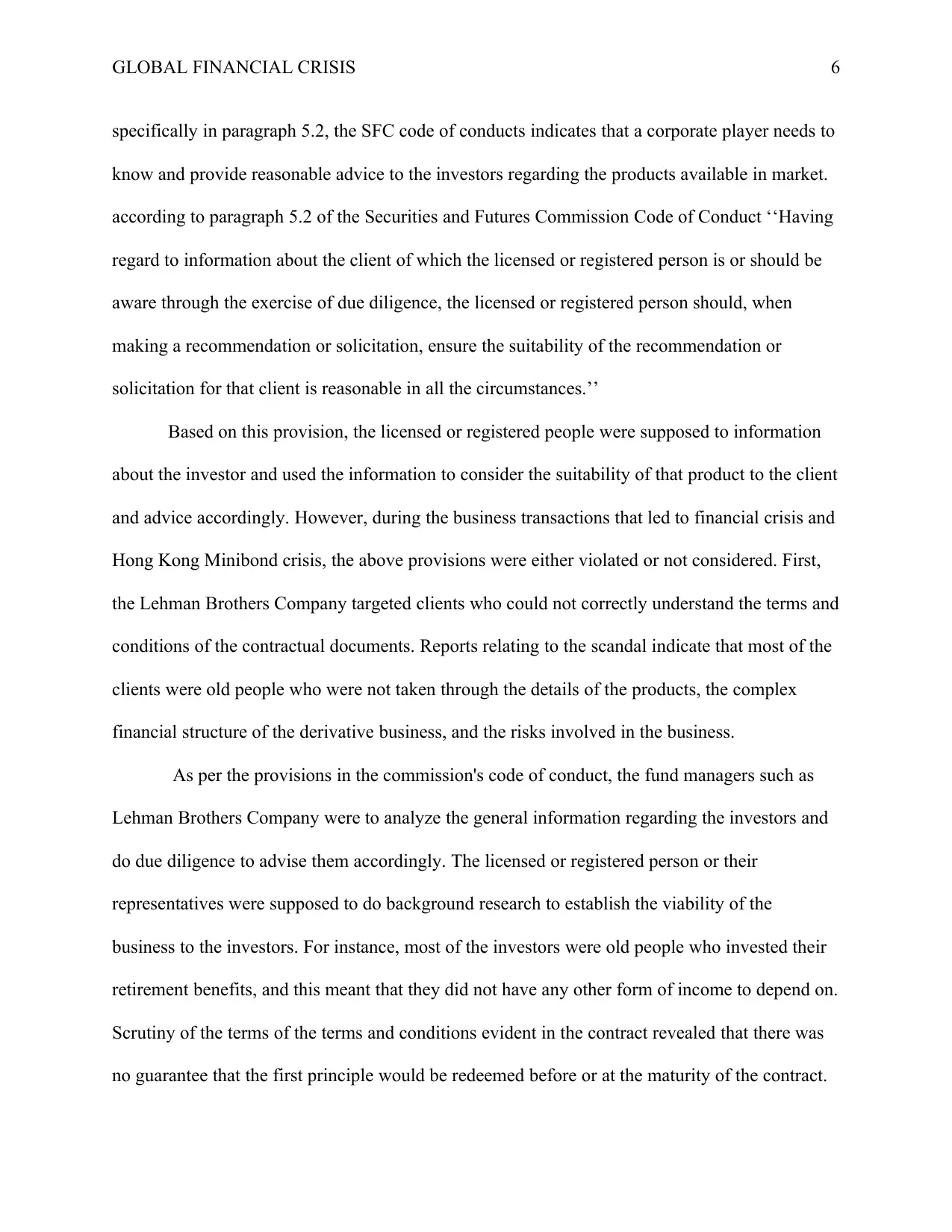
GLOBAL FINANCIAL CRISIS 6
specifically in paragraph 5.2, the SFC code of conducts indicates that a corporate player needs to
know and provide reasonable advice to the investors regarding the products available in market.
according to paragraph 5.2 of the Securities and Futures Commission Code of Conduct ‘‘Having
regard to information about the client of which the licensed or registered person is or should be
aware through the exercise of due diligence, the licensed or registered person should, when
making a recommendation or solicitation, ensure the suitability of the recommendation or
solicitation for that client is reasonable in all the circumstances.’’
Based on this provision, the licensed or registered people were supposed to information
about the investor and used the information to consider the suitability of that product to the client
and advice accordingly. However, during the business transactions that led to financial crisis and
Hong Kong Minibond crisis, the above provisions were either violated or not considered. First,
the Lehman Brothers Company targeted clients who could not correctly understand the terms and
conditions of the contractual documents. Reports relating to the scandal indicate that most of the
clients were old people who were not taken through the details of the products, the complex
financial structure of the derivative business, and the risks involved in the business.
As per the provisions in the commission's code of conduct, the fund managers such as
Lehman Brothers Company were to analyze the general information regarding the investors and
do due diligence to advise them accordingly. The licensed or registered person or their
representatives were supposed to do background research to establish the viability of the
business to the investors. For instance, most of the investors were old people who invested their
retirement benefits, and this meant that they did not have any other form of income to depend on.
Scrutiny of the terms of the terms and conditions evident in the contract revealed that there was
no guarantee that the first principle would be redeemed before or at the maturity of the contract.
specifically in paragraph 5.2, the SFC code of conducts indicates that a corporate player needs to
know and provide reasonable advice to the investors regarding the products available in market.
according to paragraph 5.2 of the Securities and Futures Commission Code of Conduct ‘‘Having
regard to information about the client of which the licensed or registered person is or should be
aware through the exercise of due diligence, the licensed or registered person should, when
making a recommendation or solicitation, ensure the suitability of the recommendation or
solicitation for that client is reasonable in all the circumstances.’’
Based on this provision, the licensed or registered people were supposed to information
about the investor and used the information to consider the suitability of that product to the client
and advice accordingly. However, during the business transactions that led to financial crisis and
Hong Kong Minibond crisis, the above provisions were either violated or not considered. First,
the Lehman Brothers Company targeted clients who could not correctly understand the terms and
conditions of the contractual documents. Reports relating to the scandal indicate that most of the
clients were old people who were not taken through the details of the products, the complex
financial structure of the derivative business, and the risks involved in the business.
As per the provisions in the commission's code of conduct, the fund managers such as
Lehman Brothers Company were to analyze the general information regarding the investors and
do due diligence to advise them accordingly. The licensed or registered person or their
representatives were supposed to do background research to establish the viability of the
business to the investors. For instance, most of the investors were old people who invested their
retirement benefits, and this meant that they did not have any other form of income to depend on.
Scrutiny of the terms of the terms and conditions evident in the contract revealed that there was
no guarantee that the first principle would be redeemed before or at the maturity of the contract.
⊘ This is a preview!⊘
Do you want full access?
Subscribe today to unlock all pages.

Trusted by 1+ million students worldwide
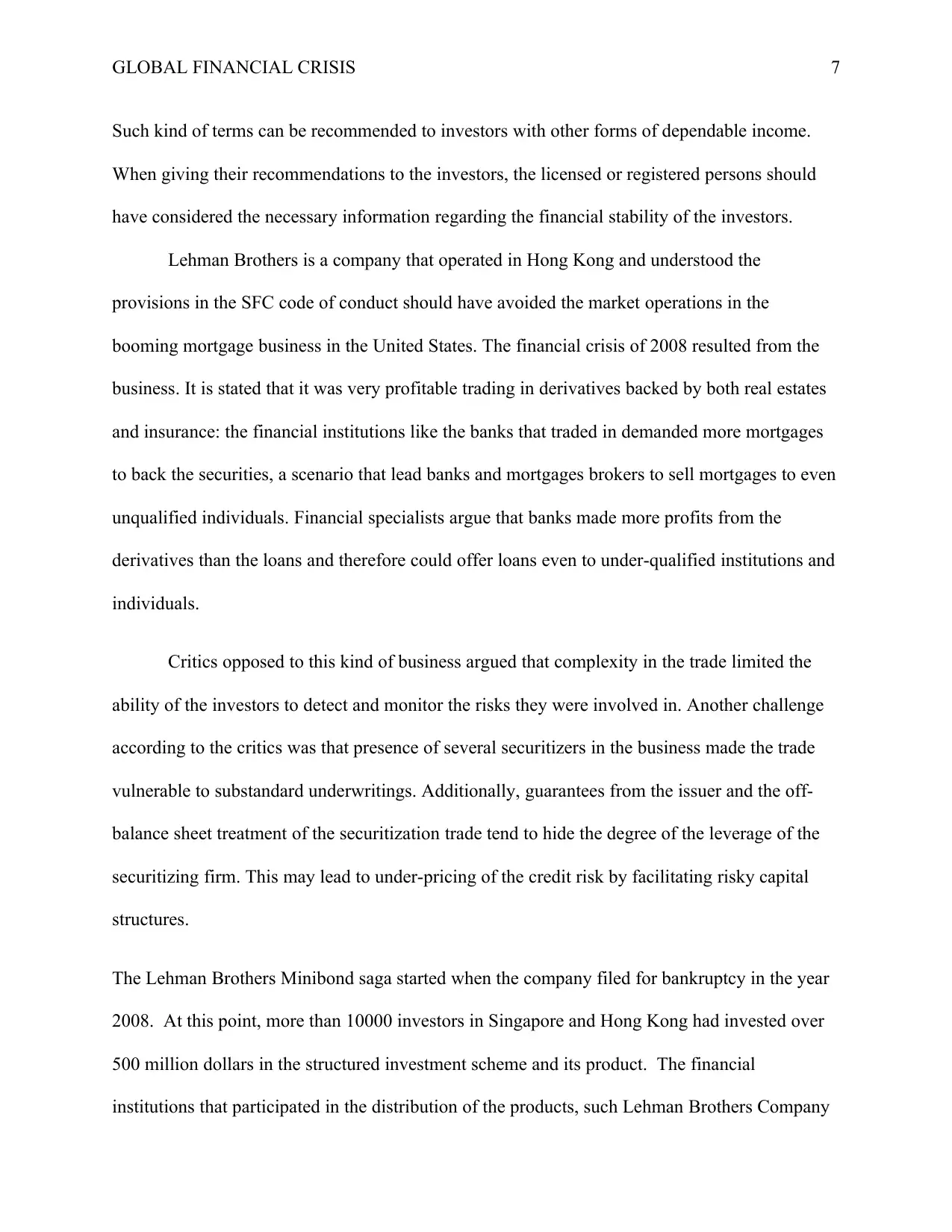
GLOBAL FINANCIAL CRISIS 7
Such kind of terms can be recommended to investors with other forms of dependable income.
When giving their recommendations to the investors, the licensed or registered persons should
have considered the necessary information regarding the financial stability of the investors.
Lehman Brothers is a company that operated in Hong Kong and understood the
provisions in the SFC code of conduct should have avoided the market operations in the
booming mortgage business in the United States. The financial crisis of 2008 resulted from the
business. It is stated that it was very profitable trading in derivatives backed by both real estates
and insurance: the financial institutions like the banks that traded in demanded more mortgages
to back the securities, a scenario that lead banks and mortgages brokers to sell mortgages to even
unqualified individuals. Financial specialists argue that banks made more profits from the
derivatives than the loans and therefore could offer loans even to under-qualified institutions and
individuals.
Critics opposed to this kind of business argued that complexity in the trade limited the
ability of the investors to detect and monitor the risks they were involved in. Another challenge
according to the critics was that presence of several securitizers in the business made the trade
vulnerable to substandard underwritings. Additionally, guarantees from the issuer and the off-
balance sheet treatment of the securitization trade tend to hide the degree of the leverage of the
securitizing firm. This may lead to under-pricing of the credit risk by facilitating risky capital
structures.
The Lehman Brothers Minibond saga started when the company filed for bankruptcy in the year
2008. At this point, more than 10000 investors in Singapore and Hong Kong had invested over
500 million dollars in the structured investment scheme and its product. The financial
institutions that participated in the distribution of the products, such Lehman Brothers Company
Such kind of terms can be recommended to investors with other forms of dependable income.
When giving their recommendations to the investors, the licensed or registered persons should
have considered the necessary information regarding the financial stability of the investors.
Lehman Brothers is a company that operated in Hong Kong and understood the
provisions in the SFC code of conduct should have avoided the market operations in the
booming mortgage business in the United States. The financial crisis of 2008 resulted from the
business. It is stated that it was very profitable trading in derivatives backed by both real estates
and insurance: the financial institutions like the banks that traded in demanded more mortgages
to back the securities, a scenario that lead banks and mortgages brokers to sell mortgages to even
unqualified individuals. Financial specialists argue that banks made more profits from the
derivatives than the loans and therefore could offer loans even to under-qualified institutions and
individuals.
Critics opposed to this kind of business argued that complexity in the trade limited the
ability of the investors to detect and monitor the risks they were involved in. Another challenge
according to the critics was that presence of several securitizers in the business made the trade
vulnerable to substandard underwritings. Additionally, guarantees from the issuer and the off-
balance sheet treatment of the securitization trade tend to hide the degree of the leverage of the
securitizing firm. This may lead to under-pricing of the credit risk by facilitating risky capital
structures.
The Lehman Brothers Minibond saga started when the company filed for bankruptcy in the year
2008. At this point, more than 10000 investors in Singapore and Hong Kong had invested over
500 million dollars in the structured investment scheme and its product. The financial
institutions that participated in the distribution of the products, such Lehman Brothers Company
Paraphrase This Document
Need a fresh take? Get an instant paraphrase of this document with our AI Paraphraser
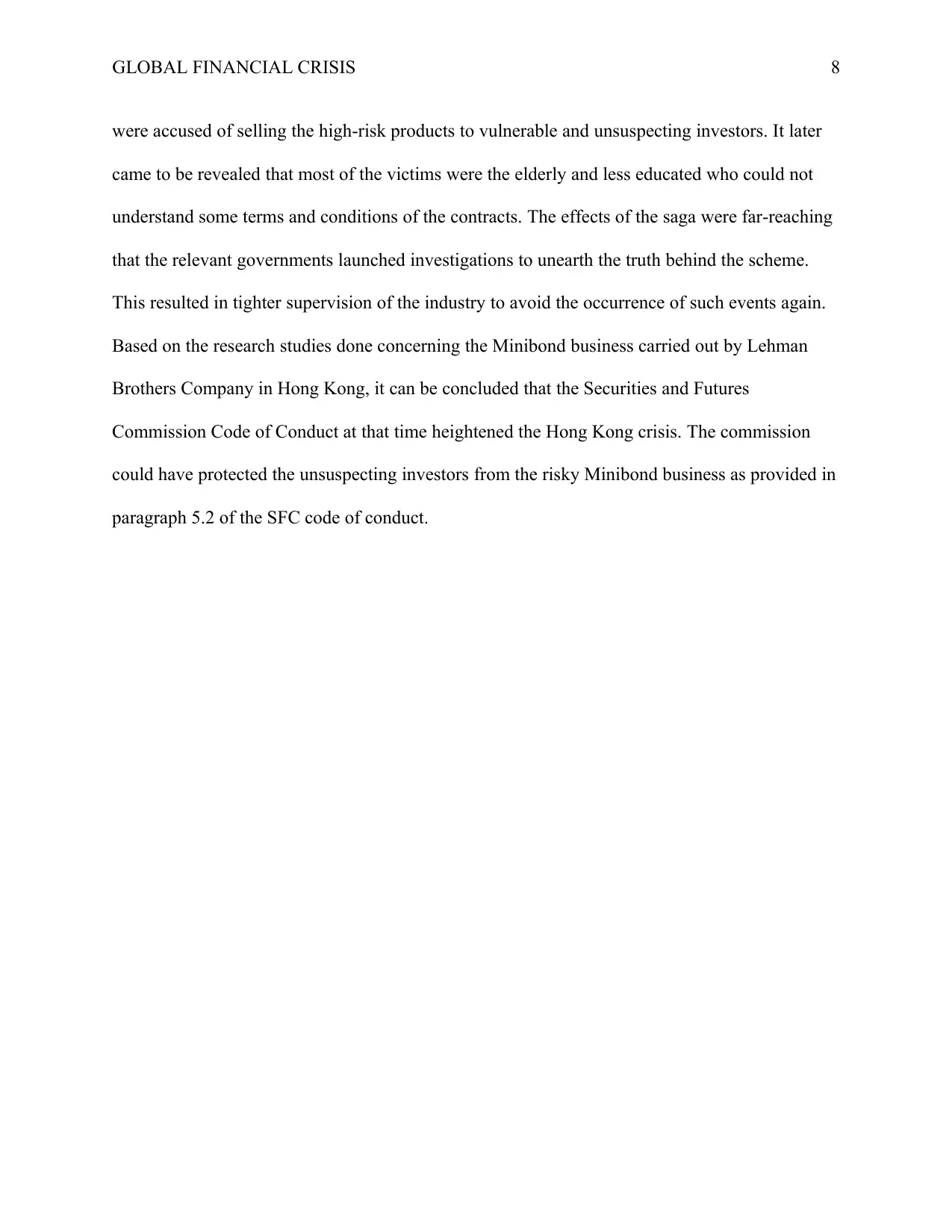
GLOBAL FINANCIAL CRISIS 8
were accused of selling the high-risk products to vulnerable and unsuspecting investors. It later
came to be revealed that most of the victims were the elderly and less educated who could not
understand some terms and conditions of the contracts. The effects of the saga were far-reaching
that the relevant governments launched investigations to unearth the truth behind the scheme.
This resulted in tighter supervision of the industry to avoid the occurrence of such events again.
Based on the research studies done concerning the Minibond business carried out by Lehman
Brothers Company in Hong Kong, it can be concluded that the Securities and Futures
Commission Code of Conduct at that time heightened the Hong Kong crisis. The commission
could have protected the unsuspecting investors from the risky Minibond business as provided in
paragraph 5.2 of the SFC code of conduct.
were accused of selling the high-risk products to vulnerable and unsuspecting investors. It later
came to be revealed that most of the victims were the elderly and less educated who could not
understand some terms and conditions of the contracts. The effects of the saga were far-reaching
that the relevant governments launched investigations to unearth the truth behind the scheme.
This resulted in tighter supervision of the industry to avoid the occurrence of such events again.
Based on the research studies done concerning the Minibond business carried out by Lehman
Brothers Company in Hong Kong, it can be concluded that the Securities and Futures
Commission Code of Conduct at that time heightened the Hong Kong crisis. The commission
could have protected the unsuspecting investors from the risky Minibond business as provided in
paragraph 5.2 of the SFC code of conduct.
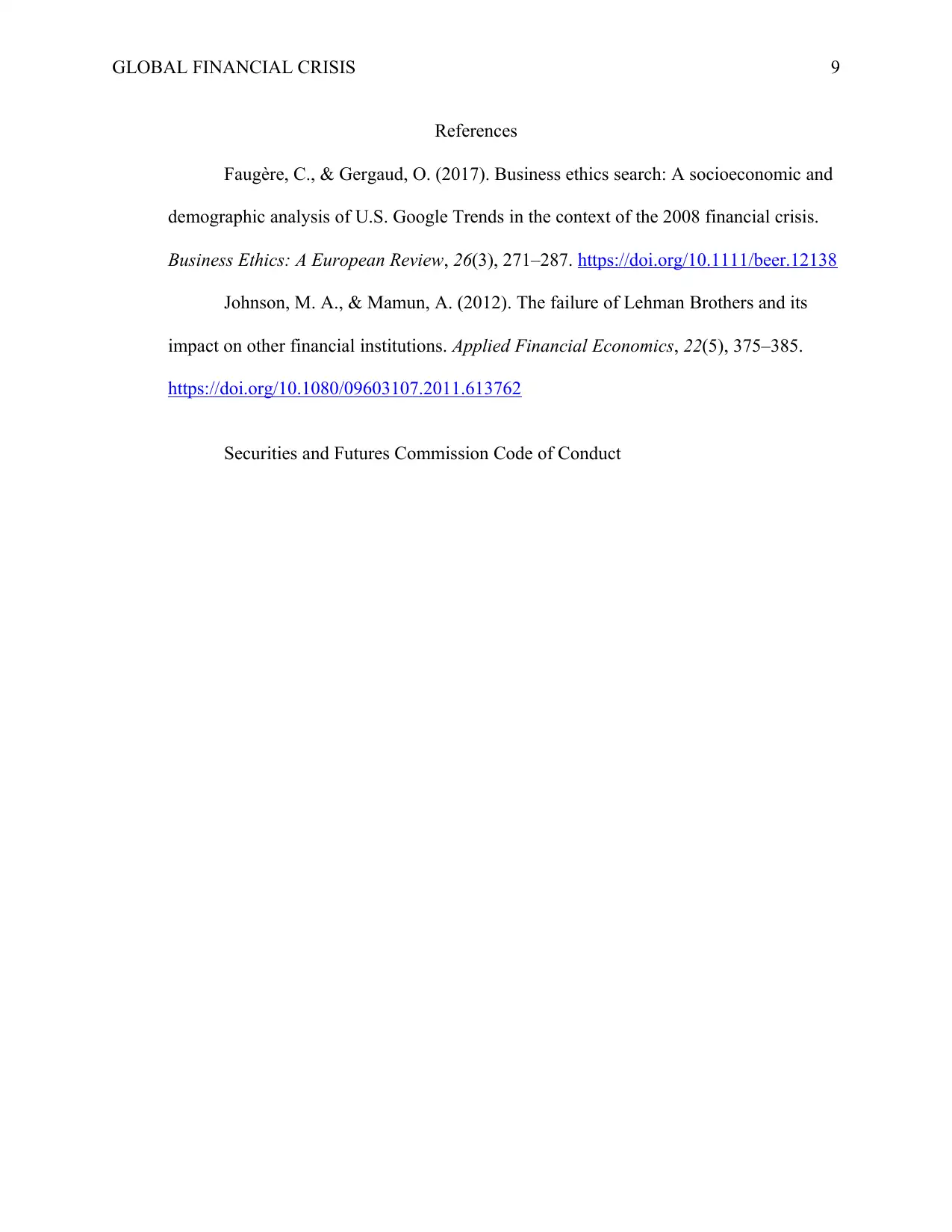
GLOBAL FINANCIAL CRISIS 9
References
Faugère, C., & Gergaud, O. (2017). Business ethics search: A socioeconomic and
demographic analysis of U.S. Google Trends in the context of the 2008 financial crisis.
Business Ethics: A European Review, 26(3), 271–287. https://doi.org/10.1111/beer.12138
Johnson, M. A., & Mamun, A. (2012). The failure of Lehman Brothers and its
impact on other financial institutions. Applied Financial Economics, 22(5), 375–385.
https://doi.org/10.1080/09603107.2011.613762
Securities and Futures Commission Code of Conduct
References
Faugère, C., & Gergaud, O. (2017). Business ethics search: A socioeconomic and
demographic analysis of U.S. Google Trends in the context of the 2008 financial crisis.
Business Ethics: A European Review, 26(3), 271–287. https://doi.org/10.1111/beer.12138
Johnson, M. A., & Mamun, A. (2012). The failure of Lehman Brothers and its
impact on other financial institutions. Applied Financial Economics, 22(5), 375–385.
https://doi.org/10.1080/09603107.2011.613762
Securities and Futures Commission Code of Conduct
⊘ This is a preview!⊘
Do you want full access?
Subscribe today to unlock all pages.

Trusted by 1+ million students worldwide
1 out of 9
Related Documents
Your All-in-One AI-Powered Toolkit for Academic Success.
+13062052269
info@desklib.com
Available 24*7 on WhatsApp / Email
![[object Object]](/_next/static/media/star-bottom.7253800d.svg)
Unlock your academic potential
Copyright © 2020–2026 A2Z Services. All Rights Reserved. Developed and managed by ZUCOL.




